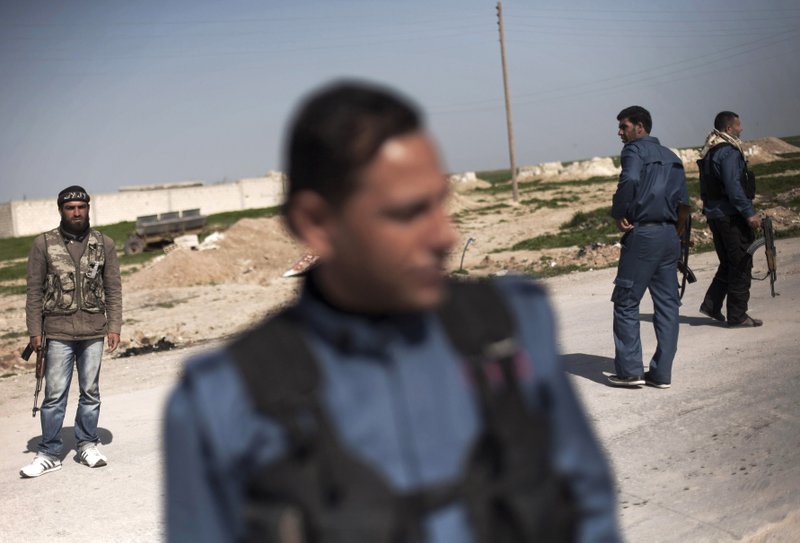BEIRUT -- Syria's Kurds imposed compulsory military service for their men to ward off a push by Islamic extremists in the predominantly Kurdish areas in northern Syria, Kurdish officials said Thursday.
The move reflects fears among Syrian Kurds that the ongoing offensive by the Islamic State group in their region may potentially reverse gains made by their ethnic minority in the past three years.
The Kurds -- a long-ostracized community in Syria -- have made unprecedented gains during the 3-year-old civil war, carving out a semiautonomous territory in the north as overstretched government troops abandoned the region to focus on defending Damascus, President Bashar Assad's seat of power.
In November, the Syrian Kurds declared their own civil administration in areas under their control, dividing it into the regions of Afrin, Kobani and Jazeera.
Kurdish fighters of the People's Protection Units successfully pushed out jihadists from a string of towns and captured stretches of territory along the borders with Turkey and Iraq.
But things changed this month, after militants from the Islamic State seized territories straddling the Iraq-Syria border where they declared a self-styled Islamic state. Using advanced weapons seized from Iraqi forces, the Islamic fighters launched an offensive against Syria's northern Kurdish region of Kobani, also known as Ayn Arab, capturing several predominantly Kurdish villages.
The fighting between the Syrian Kurds and the jihadists, which broke out July 2, left dozens dead on both sides, activists said. Hundreds of Kurds have flocked from neighboring Turkey to help their brethren, the activists said.
"The Islamic State is reinforcing its positions around us and there are clashes," said Kobani-based Kurdish journalist Barzan Isso.
Juan Mohammed, a spokesman for the Kurdish city of Qamishli, said Jazeera -- the largest of the three Syrian Kurdish territories in size and population -- adopted the draft law this week.
It requires all men to serve in "self-defense" duty for six months. The law went into effect this week.
Isso said that according to the draft law, one man -- age 18 to 30 -- in every family is required to serve. After six months, the men can decide if they want to go to the front lines.
Kurds are the largest ethnic minority in Syria, making up more than 10 percent of the country's 23 million people.
The long-run battles between the Syrian Kurds and the Islamic militants have added another layer to the complex Syrian civil war, which also has seen bitter infighting among Sunni rebel factions and a bloody rivalry between the al-Qaida-linked Nusra Front and their former allies of the Islamic State.
Also Thursday, the Britain-based Syrian Observatory for Human Rights said Islamic State fighters captured a gas field east of the central province of Homs after heavy battles that killed 23 soldiers and guards at the facility.
The activist group said more than 300 people, including guards, soldiers and employees, at the field also were wounded or captured. The report could not be independently confirmed.
The Islamic State has captured much of Syria's oil fields in the eastern province of Deir el-Zour over the past weeks.
In the United States on Thursday, a Senate panel grudgingly backed President Barack Obama's plan to train and arm vetted Syrian rebels.
The Appropriations Committee endorsed Obama's proposal to spend $500 million for a Pentagon-run program that would broaden previous covert operations to equip rebels fighting forces loyal to Assad and Sunni extremists. The money is contained in a $549.3 billion defense spending bill for the fiscal year beginning Oct. 1.
Sen. Mark Pryor, D-Ark., had offered an amendment to the bill that would have negated the program and transferred the money to overall spending on counterterrorism.
Pryor questioned whether the administration can determine the moderate forces in Syria as the civil war grinds on with 170,000 dead. He said it would be impossible to keep track of weapons that could further destabilize the region and expressed doubts about an open-ended authorization to the administration.
"Our friends today could be our enemies tomorrow," Pryor said.
As a reminder to his colleagues, he pointed to the current situation in Iraq where Iraqi security forces are struggling against the Islamic State extremist group after years of U.S. training and military equipment.
Sen. Lindsey Graham, R-S.C., said it was "probably too little, too late" but a step that should be taken.
In the end, the committee rejected Pryor's amendment on a 21-9 vote, but he had the support of Democrats and Republicans, including Budget Committee Chairman Patty Murray, D-Wash., and Sen. John Boozman, R-Ark.
Information for this article was contributed by Donna Cassata of The Associated Press.
A Section on 07/18/2014


